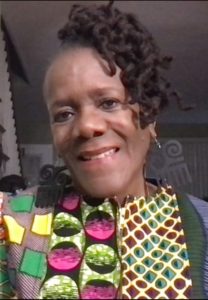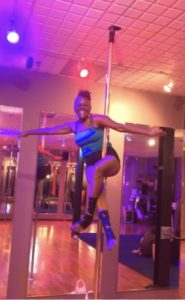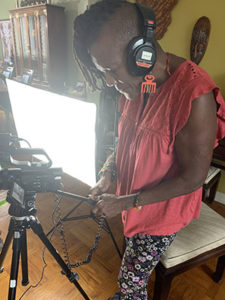
 Our January 2021 Shero of the Month is Asha Molock of Philadelphia, Pennsylvania. A retired schoolteacher who has been living with HIV for twenty years this year, Asha has as many creative talents as she does responsibilities, and she never misses an opportunity to educate her community and fight stigma. “Asha is one of the most inspiring people I’ve ever met,” said PWN Communications Director Jennie Smith-Camejo. “She does so many different things well and isn’t afraid of going out on a limb and trying new stuff. She does not let age hold her back any more than she lets HIV—when I see her doing burpees on Instagram and making documentaries in her free time, I really start wondering what I am doing with my life! She’s also just a wonderful, humble, generous human being.”
Our January 2021 Shero of the Month is Asha Molock of Philadelphia, Pennsylvania. A retired schoolteacher who has been living with HIV for twenty years this year, Asha has as many creative talents as she does responsibilities, and she never misses an opportunity to educate her community and fight stigma. “Asha is one of the most inspiring people I’ve ever met,” said PWN Communications Director Jennie Smith-Camejo. “She does so many different things well and isn’t afraid of going out on a limb and trying new stuff. She does not let age hold her back any more than she lets HIV—when I see her doing burpees on Instagram and making documentaries in her free time, I really start wondering what I am doing with my life! She’s also just a wonderful, humble, generous human being.”
Asha is a caregiver for her 92-year-old mother and her adult son with special needs; during the pandemic, she has also been supervising her seven-year-old granddaughter’s schooling via Google Meets classroom. Still, she somehow still found the time to write, direct, and produce a documentary film over the past year–and she still manages to get in two virtual sessions a week with her personal trainer and make her Friday pole dancing class.
Creating a documentary is as much work as it sounds like–especially if you are not a professional filmmaker. Asha’s forthcoming film, Fuel for the Fire: HIV Stigma in the Black Community, is the product of months of classes with Scribe Video Center, a nonprofit organization that trains and develops new and experienced media makers to use electronic media for progressive social change, as well as a whole lot of work outside of class. She was encouraged by the program manager of Scribe to apply for their film scholarship when they spoke at a screening of one of her nieces’ films.
“He asked about my story; I told him about being positive and he said no one had ever done a documentary on HIV [as part of the program],” she explained. “That motivated me a little bit. I told him I’d think about it: I’m a caregiver, I don’t have a lot of time. He said, ‘Make the time.'”
 Make the time, she did. Classes started in person in December of 2019, but then stopped completely in March when the pandemic shut everything down. They resumed virtually in June–but by then, they were behind and had to make up for a lot of lost time. “They piled up on top of each other. There was production management and 14 week production workshops overlapped with Premiere Pro classes. I was on Zoom six hours a week for me, and every day for my granddaughter; then, my son goes to behavioral health program, and they were on Zoom three days a week.”
Make the time, she did. Classes started in person in December of 2019, but then stopped completely in March when the pandemic shut everything down. They resumed virtually in June–but by then, they were behind and had to make up for a lot of lost time. “They piled up on top of each other. There was production management and 14 week production workshops overlapped with Premiere Pro classes. I was on Zoom six hours a week for me, and every day for my granddaughter; then, my son goes to behavioral health program, and they were on Zoom three days a week.”
“What also made it challenging is that I had written a shooting script–I had learned all this stuff in class, how to do a blueprint for a documentary. Everything was laid out for us but we had to do the work,” she said. “I did a shooting script and had to change the whole documentary and rewrite it, because I couldn’t get out to interview people. I had no intention of putting myself in it, but I was the only person I could control as far as shooting.”
She had to find creative solutions. One subject, Andrea Lamour-Harrington, did her interview via videoconference. Others she was able to interview in person by taking plenty of covid safety precautions. And she had her niece–also a graduate of the Scribe program–film interviews with her.
While she still has a couple of steps left to finish the film and isn’t sure yet exactly when or how it will be released to the public, she feels it has been a rewarding process. “I ask myself, Why do I do this? I start thinking: First of all, I want to create my own narrative, even when I’m not here anymore. I want to tell my own story. I hear so many people saying, ‘Oh, my uncle had HIV and he passed.’ And I’m like, That’s the end of his story? There’s nothing else to say about him? I think about my granddaughter, whatever descendants I have, and I want them to say, ‘This is my grandma. She had something called HIV, but she also wrote books about it and made a film.’ I want to leave a legacy. Since I can’t be as active in advocacy as I used to, I try to contribute whatever I can.”
The documentary isn’t Asha’s first foray into using the arts to educate and fight stigma. She has published two books: Gaining Strength from Weakness: 101 Positive Thoughts for HIV-Positive People, which is a collection of affirmations she used to write for herself while struggling with her diagnosis, and The Underground Woman: From Prisoner to Freedom, a memoir about her experience being diagnosed with HIV as a middle-aged woman and her journey from hiding her status in shame to becoming a vocal public advocate.
“I didn’t intend to write a book,” she said. “You know the saying that writing pulls pain? It started out when I was not open with my status, that whole 10 years I was keeping it secret, I was writing down little affirmations on Post-Its and sticking them on the mirror, trying to uplift myself a little bit so I could feel better. [These became Gaining Strength from Weakness.] I was also writing them down in a book. I started journaling, and this is where The Underground Woman came from. A friend asked, ‘Why don’t you turn it into a book?’ Someone else suggested writing classes. I started taking writing classes and started meeting other authors. I got really motivated by talking with them.”
When Asha was diagnosed in 2001, she never would have imagined herself publishing books or producing documentary films about living with HIV. For ten long years, she hid her diagnosis from even close friends and much of her family. Then, in 2011, a case manager who ran a support group she attended had a request: A reporter for the Philadelphia Daily News wanted to interview a woman living with HIV for a story she was writing for National Women and Girls HIV/AIDS Awareness Day. Asha had never shared her status publicly, but she thought about it and talked to her mother about it. “She asked me how long I was going to hold this secret. Better to tell the story your way than to let it get out and someone else tell it first. And that was it.”
Though she ran into some ignorance and stigma when she told family members ahead of the news article, she doesn’t regret her decision to go public and has never looked back. “It’s rough when you’re hiding. You’re really hiding from yourself,” she explained. “It’s a feeling that’s hard to describe when you just don’t have to hide anymore.”


